Treat Yourself Naturally
Step It Up and Put Your Best Foot Forward
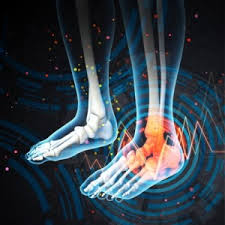 Reduce Foot Pain
Reduce Foot Pain
Soooo….do your feet hurt? Do they sting when you walk? Or, are they stiff when you get up in the morning? Perhaps they cramp up in the middle of the night. Do they swell up after a large meal or too much alcohol? Does the ball of your foot suffer from sharp pains after a run? Have you been diagnosed with a Neuroma? Are your toes sore? Do you have hammer toes or bunions? Does the arch of your foot ache? Have you been diagnosed with Plantar Fasciitis and don’t know how to alleviate it? Here is a LINK to an article by St. John Clark Pain Treatment Center about Plantar Fasciitis.
Here are the links to Three of My Videos Reviewing Home Techniques to Reduce Low Leg, Ankle, Heel, Foot Pain.
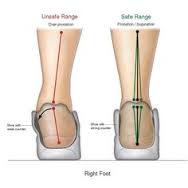 Home Therapy Options to Reduce Foot Pain
Home Therapy Options to Reduce Foot Pain
There are several therapeutic options for you to perform at home that can address, reduce and even alleviate foot pain. The best place to start is to look at your bare feet in a mirror when standing. Notice the arch of your foot. Does your foot roll in (pronate), or roll out (supinate)?
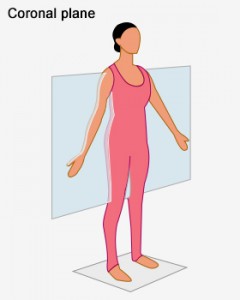 Coronal Plane
Coronal Plane
Stand against a wall and adjust your posture so your coronal plane is in line. Feel your feet on the floor or the ground. Place 70% of your weight on your heels and 30 % of your weight on the balls of your feet. Engage your core (abdominal muscles). Squeeze your buns, roll your shoulders back and place your head squarely on top of your shoulders. Tune in to your feet. Note your balance or imbalance. How do the feet feel? Are they stiff little buggers? Where do you feel the discomfort? Spread your toes and create space in your phalanges (toes) and your metatarsals (the bones of the foot). Notice your ankles and low legs. Pause and evaluate. Ask yourself what you might do to create happier feet.
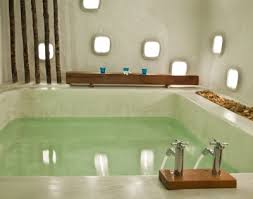 Epsom Salt Foot Bath
Epsom Salt Foot Bath
Draw an Epsom Salt foot bath. Use more of the salt than prescribed. They usually prescribe one cup. I prefer to double it. It is a natural muscle relaxer and designed to be used therapeutically. Immerse your whole foot and preferably your low leg. This will affect the Extensors and Flexors of the toes and foot that rise up into the low leg. Soak for 20 minutes.
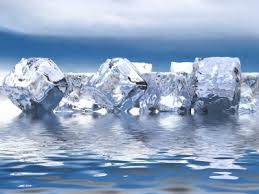 Ice Plunge
Ice Plunge
You can also do an ice bath plunge.Where you live will make a difference whether you use cold tap water or add ice to your water. Start with cold tap water and then gradually add ice. This therapy can be done in five minutes or less. If you don’t like it or it doesn’t resonate with you, don’t do it. Most people wince when I prescribe this, but I can tell you from years of experience, cold plunges for the feet ( as well as the entire body) can be incredibly effective and surprisingly therapeutic!
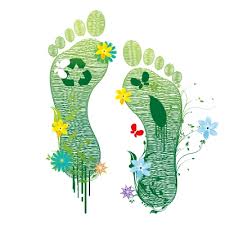 Contrast Therapy for the Feet
Contrast Therapy for the Feet
Warm Epsom salt bath and cold bath plunge in contrast soften and soothe tissue. The feet will be much happier with just this addition. Begin with the warm Epsom Salt Bath. Follow with a cold water plunge. Finish with the Epsom Salt Bath. Listen to yourself. Pay attention. Don’t do it if it is uncomfortable. The warm soak should feel good. The cold plunge, invigorating. Daily application is best if you are suffering from daily foot pain. It takes time but is the best way to treat painful feet and sore low legs. Treat yourself naturally at home. The contrast therapy stimulates your lymph system. It increases blood flow. Natural healers. Healers that are ready to do their job if you give them a little nudge. Use whichever one feels the best to you. Both are therapeutic. While in the bath gently move the feet in various directions.
Manual Manipulation
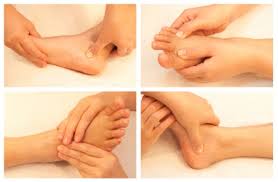 Self Massage for the Feet
Self Massage for the Feet
When you are finished soaking the feet are ready for manual manipulation. By YOU! Yes, YOU! Self massage your feet! Sit down on the floor, preferably with your back supported. You can be seated in a chair. Bring one foot up and begin to squeeze it and spread it out. Wiggle the bones of the foot. Roll the ankles, one and then the other, in each direction. Draw the alphabet with each foot. The idea is to set aside time to create movement, increase range of movement, decrease pain and stiffness, so you should focus on your feet and notice what is happening with them. Take each toe between your fingers and roll them, squeeze, wiggle and roll them.
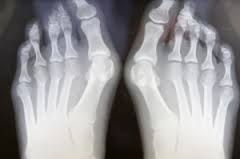 Be Gentle with Sore Toes
Be Gentle with Sore Toes
If you have sore toes, bunions, hammer toes, they need this work! Begin slow and gently. These are your foundation joints, your connection to the earth. Therefore, we want the feet to be fluid, joyful, happy and bouncy. You can decrease foot pain and increase flexibility in the feet. It takes time and time is what will make this work successful. Soft tissue creates pain. Consequently, releasing the soft tissue that connects the toes to the feet and the feet to the leg will open tough, sore areas creating space for better movement. There are some yoga poses that may help decrease bunion pain, increasing range of motion and fluidity in that joint. Here is a LINK for a VIDEO that discusses HAMMER TOES, presented by Kevin Wade, LMT from the St. John/Clark Pain Treatment Center in Clearwater Florida.
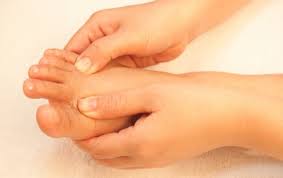 Stretch The Feet
Stretch The Feet
Gently stretch the toes back and forth. Lying on your back use a yoga strap or the soft belt of a robe and place it on the ball of the foot and move it around. Then walk the fingers on the ball of the foot, in the arch and push on the heel. You can squeeze the heel. You can’t be mamsy pamsy with the feet. They can take deep work. Create an intention for your foot work session. An intention of less pain, freedom of movement and happy feet!
Rollers and Balls Reduce Trigger Points
First, sit on the floor and use a ball or a small foam or trigger point roller to do the work. Then you can sit in a chair, followed by standing. Thereby increasing the pressure. While using these tools on pressure (trigger ) points of the feet, go slowly, and breath. When you find sore, tight area (and you will!) take your time. Take 8-12 seconds and breath two or three big deep breaths. Move around, coming back to a particularly sore area. Feel the tissue, the fascia, softening and releasing. Give each area time to process the work. This may require repetition on stubborn areas, particularly feet that do difficult daily work and have not been given any attention. As a result, the feet will respond. Consequently, the feet will soften.
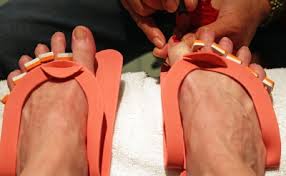 Yoga Toes
Yoga Toes
Use supplies you have on hand at home. Separate the toes for a little bit of time to increase space and range of motion.
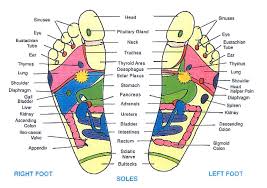 Foot Reflexology
Foot Reflexology
Foot Reflexology can be done at home. Just follow any chart you find and gently work the area in a circular motion. Taking time to feel the changes in the tissue. This is an ancient healing therapy that could be of great benefit to you.
Massage the top of the Foot
Working the dorsal side of the foot (the top of the foot) squeeze and spread and gently work between the tendons. Use a little stone, a soft pencil eraser or your fingers. T- bars are an excellent option. All resources can be found in the column on the right. Roll the foot and roll the ankle, both ways. The muscles of the low leg attach down around the heel (lateral and medial maleolus) and down into the feet and toes, serving as your Flexors and Extensors.
You could take a break here, but if you really want to be thorough you can work the low leg, all the way up to the knee. You can use the rollers on the calf muscles (gastrocnemius and soleus) to alleviate leg cramps and spasms. You can work the Tibialis anterior and Tibialis posterior, shin splints.
Calf Stretcher
Utilizing the calf stretcher has been extremely helpful to my patients. This can be done seated or standing. Always be sure to hold on so you are balanced safely. When using the calf stretcher, take your time and move slowly. Hold the stretch for 8-12 seconds and 2 or 3 breaths and then release. Be mindful not to over stretch.
High Heels Be Gone!
Reduce the use of high heels and evaluate your foot wear. Is it supportive? Do the shoes feel good? Is your arch supported? What else may you need to support your feet for the desired activity?
Swollen Ankles
Swollen ankles could be a sign of a more serious issue so consult your physician regarding edema and swollen ankles. Lymph Drainage is a gentle and useful technique for addressing stagnant lymph. Here is a link to an article for simple do it yourself lymph drainage.
Additional Information
Additional information on foot pain and low leg pain are offered here .
So step it up and get busy! Good Luck!

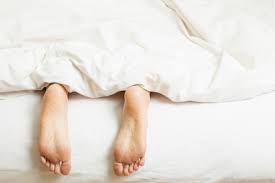
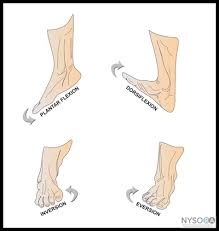
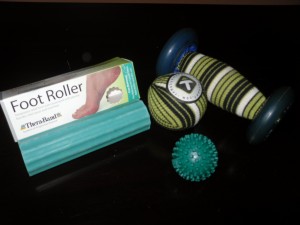
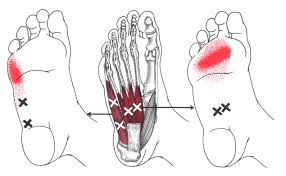
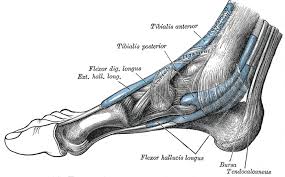
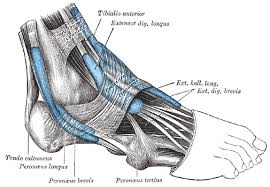
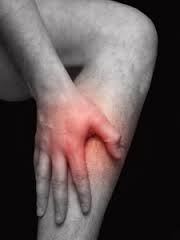
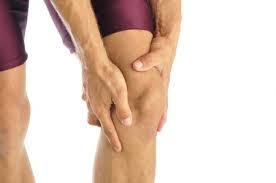
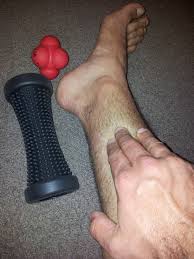
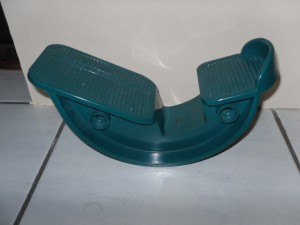
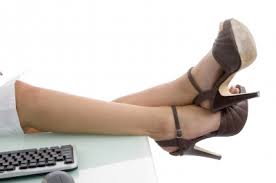
This is very detailed and informative! I usually get foot pain whenever I go to the mall for shopping due to long hours of walking. I’ll need to buy some of these tools to reduce foot pain. Thanks for sharing this!
Wonderful! Hello Aika! Thank you for commenting. This is a beginner video (there a couple…). Intermediate and Advanced videos will be out mid year, June.
Jenny
As a runner we are prone to foot pain, great tips, informative and well written.
Thank you very much !
Jenny